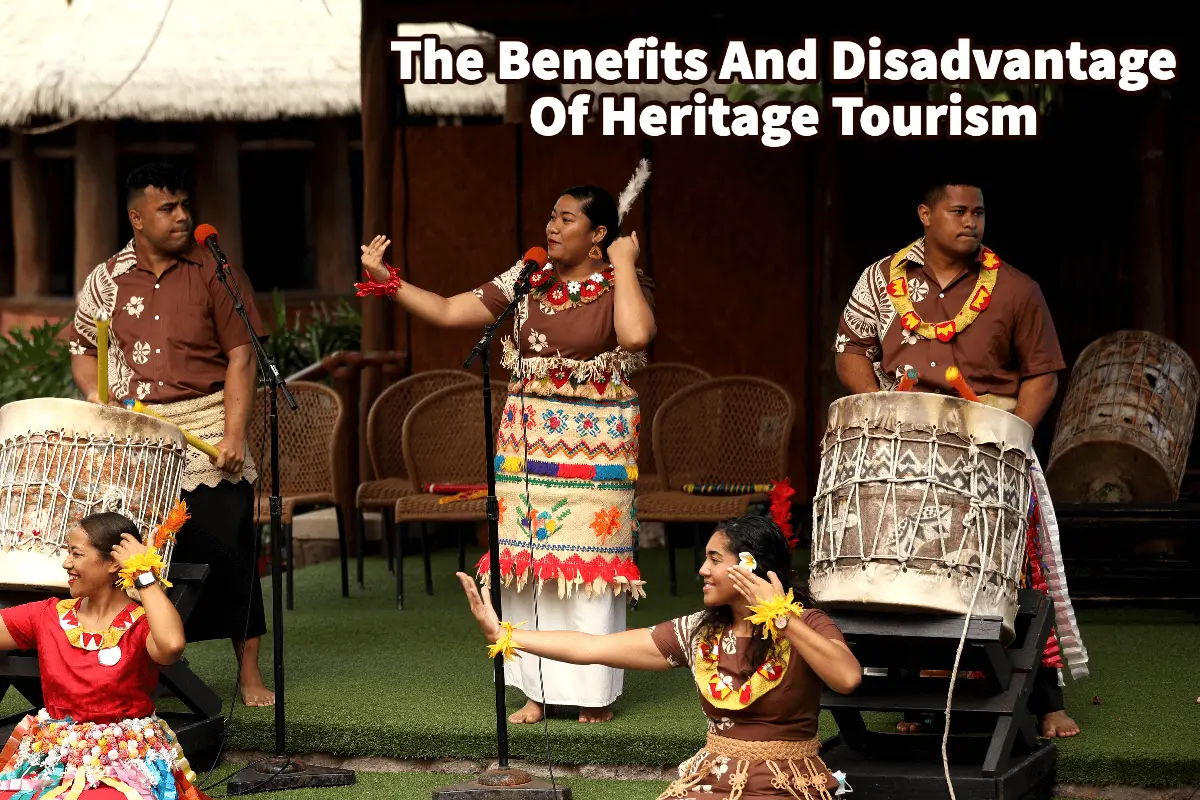A new way of travel is for people to travel with a purpose, either for heritage or cultural travel, and to learn something new along the way. We are grateful for traveling to discover the world or live as global citizens.
There are many benefits and disadvantages to heritage tourism. Heritage tourism can be a fantastic way to discover another culture, location, or history. But if it is done incorrectly, it can be a disaster not just for the culture but also for the society and may bring irreversible environmental issues.
Table of Contents
- Benefits Of Heritage Tourism
- Disadvantage Of Heritage Tourism
- 10 Reasons Why Heritage Tourism Remains a Timeless Attraction
- Frequently Asked Questions
- Related Questions
Benefits Of Heritage Tourism
Heritage tourism has been a part of the fabric of traveling for centuries. Throughout many different nations and cultures, it is seen as an important way to learn about history in its most original form.
Heritage tourism goes beyond sightseeing to provide experiences that connect visitors with a region, culture or activity’s unique past. The benefits of engaging in heritage travel include learning more about local cultural traditions, supporting local economies, causing positive environmental impacts and gaining relief from the stressors of modern life.
Through heritage tourism trips, travelers can immerse themselves into a place’s culture by experiencing first-hand the stories associated with its significant landmarks and monuments – something they wouldn’t be able to do unless they were there!
That is why there are many benefits to heritage tourism and how this tourism can help a country, culture, and society.
Heritage Tourism Helps Others Discover A Culture
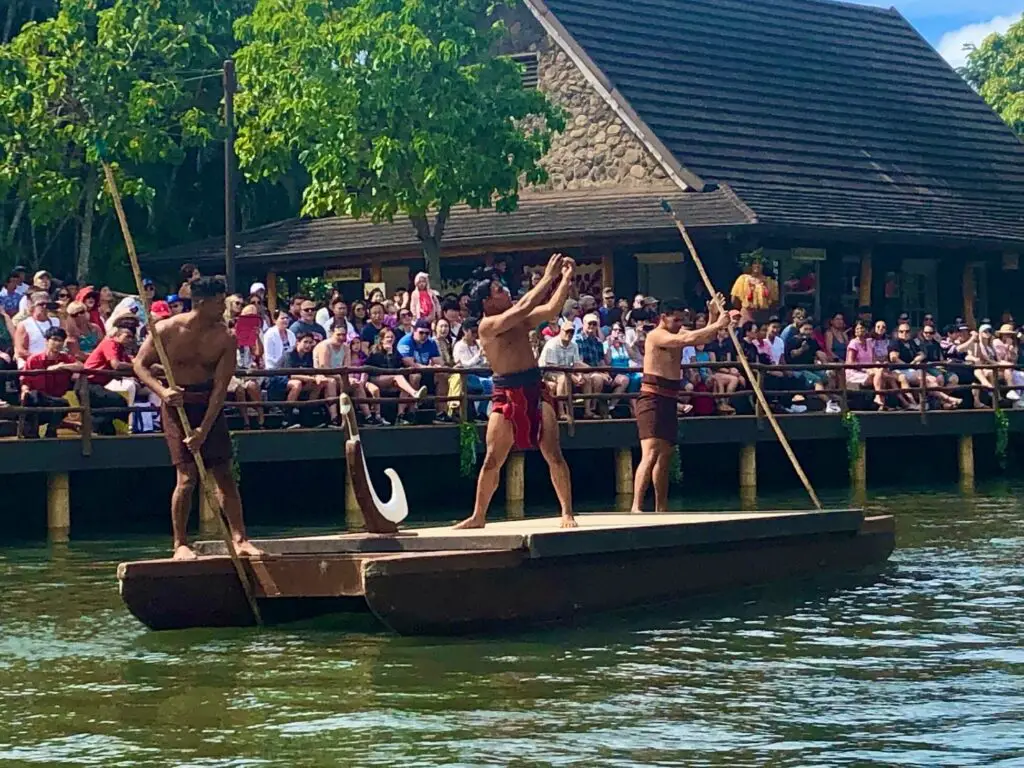
Whenever I visit Hawaii, one of my favorite places is the Polynesian Cultural Center in Laie, Oahu, Hawaii. The Polynesia Cultural Center is part of the BYU Hawaii campus and brings cultures from the Polynesian Islands.
At the Polynesian Cultural Center, you can discover the food, dance, houses, and cultures of many people who live in Polynesia. The center is an excellent example of an organization that is seeking to help to preserve the culture of the Polynesian islands while at the same time allowing visitors to be able to explore and understand a bit more about this beautiful part of the world.
I have always been fascinated with the Polynesian culture and have loved watching many of the shows at the Polynesian Cultural Center, especially their night show, which has some beautiful fire dances and other types of dances from the Polynesian area.
I have never been to many of these countries in Polynesia, but I have discovered and appreciated these cultures because I visited the Polynesian Cultural Center in Hawaii.
At the core of what good heritage tourism does, is that it helps individuals to be able to understand a culture, location, or even another place or time. Heritage tourism allows us to be transported to a place we would usually not experience.
Heritage Tourism Can Give An Economic Boost
Face it, without heritage tourism, there would be many cultures that cannot survive or sustain themselves. The culture and the people may remain so impoverished that their culture can essentially disappear.
Most notable would be when people realize that they can no longer find any sustainable work in their own culture or country, so they try to go to another location to find work. Eventually, that culture may disappear or become extinct.
Heritage travel may give an area a much-needed economic boost and allow individuals to remain in their culture while at the same time earning a fair wage and a decent income.

In Sapa, Vietnam, many Hmong tour guides have a better life because they can participate in tourism. It allows these Hmong guides to keep their culture alive and work in their home location while showing others a bit about their Hmong culture.
Many of these Hmong tour guides are far better off financially than some of the other Hmong counterparts that live in other parts of Vietnam, where there is not a lot of tourism. The tourism industry can support their families, and they learn to speak another language, such as English; this helps ensure their children can remain in school and be educated.
Heritage Tourism Can Help Preserve Cultures And History
Heritage tourism can help a country, or location, or preserve its culture and history. Without tourism, there would not be an economic or other benefit to investing in all of the things that are invested in that need to be invested in to ensure that culture or an aspect of history remains alive.
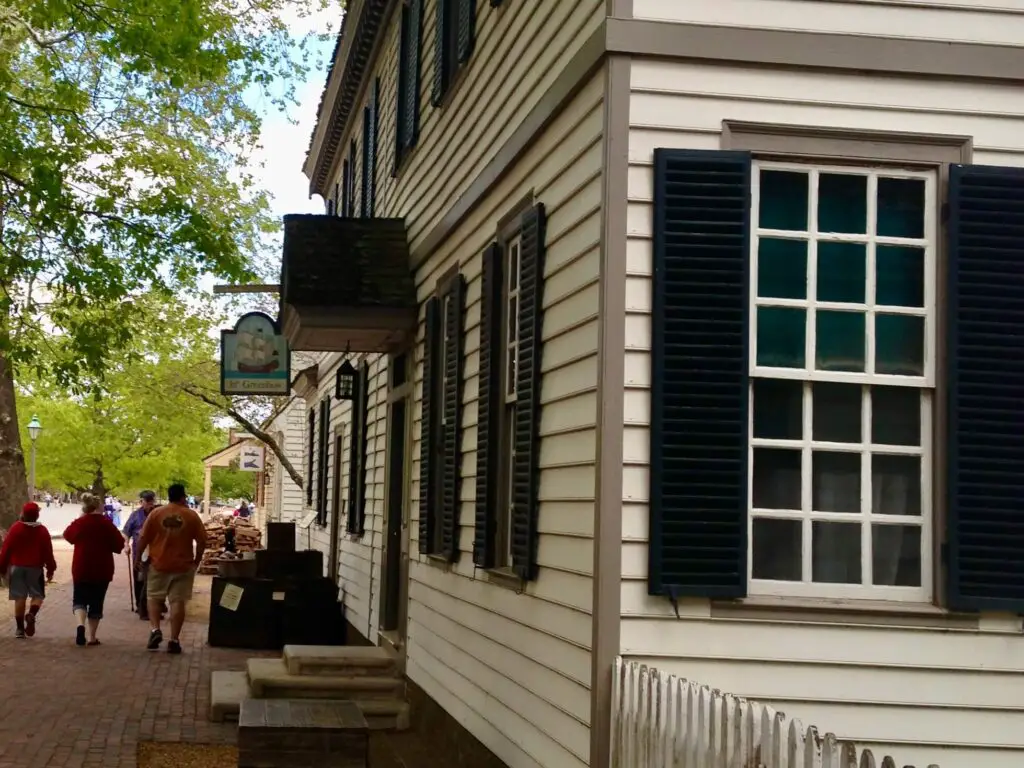
A great example of a location that has been able to do this is Colonial Williamsburg in the United States. When you visit Colonial Williamsburg is fascinating to see all of the old buildings and the way of life that many of our colonial ancestors lived during that time.
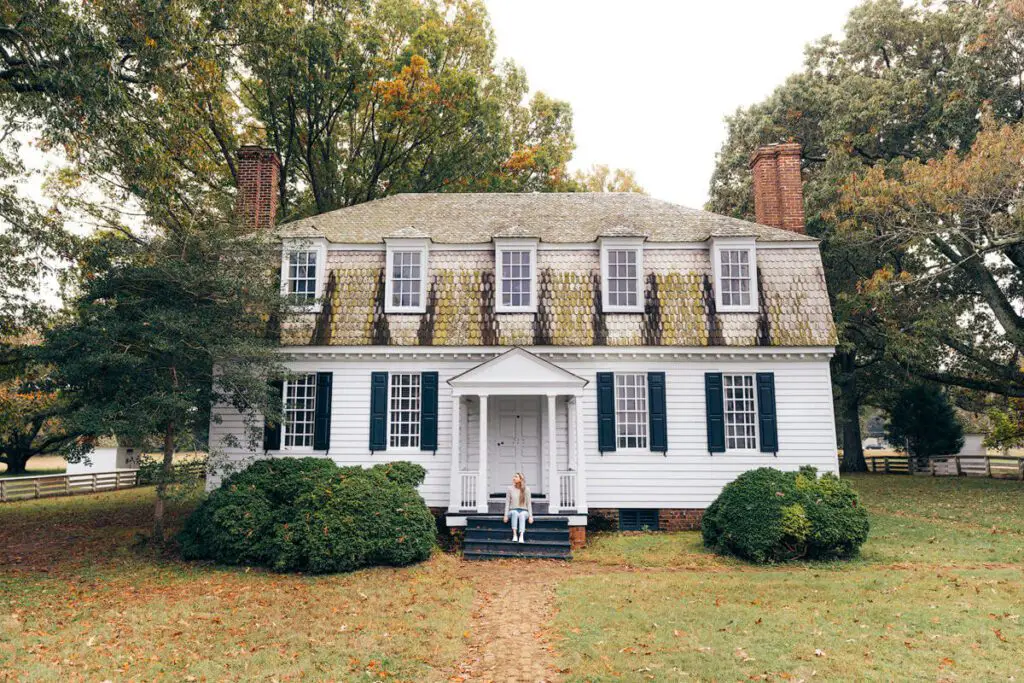
Without the operation of Colonial Williamsburg, this part of the United States’ history could almost be lost entirely. But because of the Colonial Williamsburg Foundation, we can still learn about life in Colonial Williamsburg during this period.
Disadvantage Of Heritage Tourism
The growing demand for heritage tourism has been a blessing and, in some cases, a curse. Although it allows for a beautiful appreciation of ancient cultures and their history, there are also potential drawbacks to this form of tourism that must be considered.
From the increasingly expensive entry fees per attraction to the environmental impacts created by hordes of eager tourists clambering to gawk at historical monuments and artifacts—these consequences can degrade nature reserves, disrupt local wildlife populations as well as crowd out locals from visiting—the disadvantages may have negative effects on both international travelers and native people alike. .
Heritage tourism’s disadvantages can lead to other cultural or country issues. The problem is that if heritage tour tourism is not done correctly, it can become a social or cultural problem.
Heritage Tourism Can Turn A Culture Into A Circus Act
If heritage tourism is not done correctly, it can almost turn the culture into a circus act. This means that the culture will be lost and hurt by heritage tourism.
The truth is that there are very few places now that are still off the beaten track. Today airplanes, trains, or buses can reach most parts of the world, everything from an Eskimo Village to an Amazon tribe.
People can go on a tour to infringe upon individuals and communities like never before, and instead of trying to protect and understand these places of the world, they may treat them as a circus act.
The danger of Heritage tourism is that for a place to lure in tourism dollars, they may destroy their culture and way of life and make it seem cheap or unimportant.
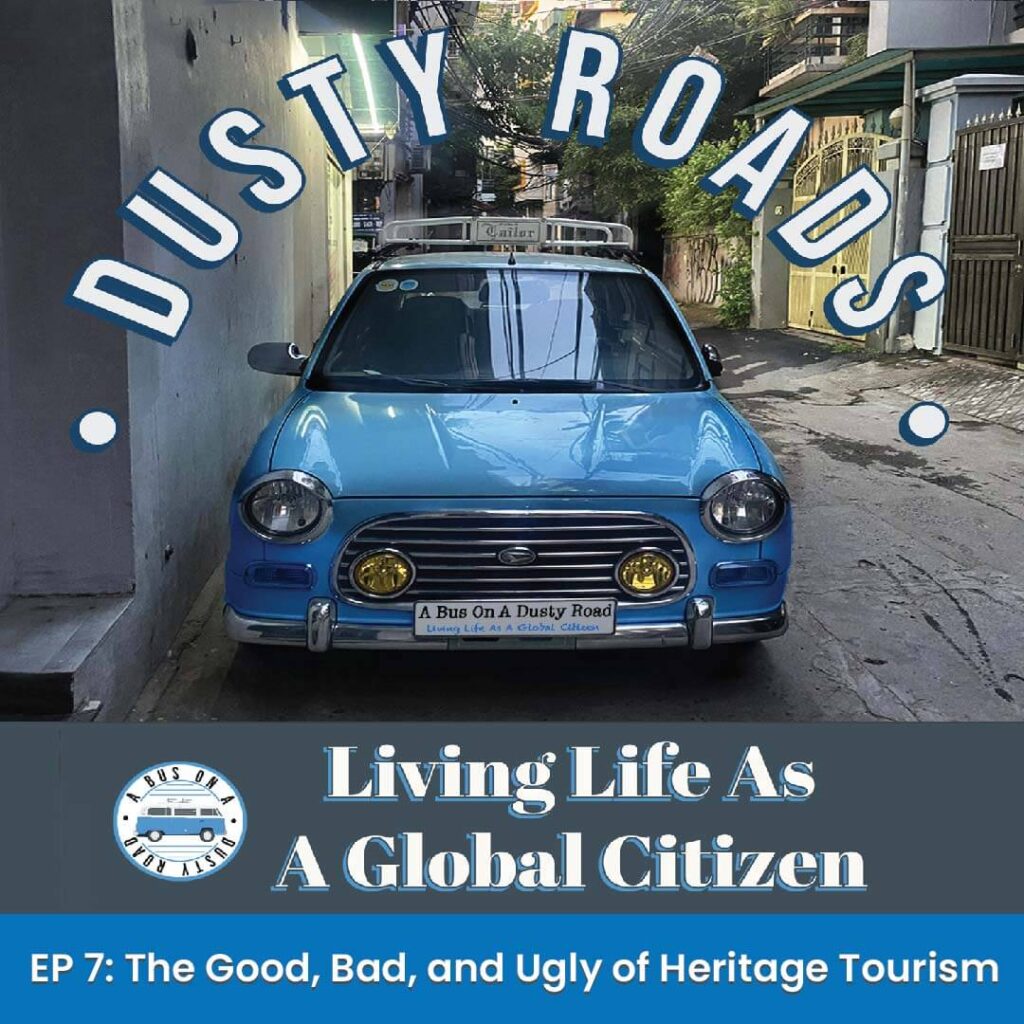
Listen To Our Podcast About The Good, Bad, And Ugly of Heritage Tourism below or by clicking here.
Heritage Tourism Can Destroy The Culture Or Location
When many early explorers traveled worldwide on their large sailing ships, they also brought many diseases. Today, with global pandemics and other aspects of life, heritage tourism can cause many social, political, and even cultural issues that a location may have never seen before.
I have seen in some areas where suddenly there can be an influx of certain types of foreigners or foreign influences that brothels, prostitution, and other things like this start to spring up in locations that once never thought of having these establishments.
The locals began to see that they could earn and get foreign dollars by providing these services. But instead, what happens a lot of times is an increase in diseases, unwed mothers, and the society and family unit starts to disintegrate.
I have seen this happen worldwide, especially in many parts of Asia. Even under the disguise of Heritage tourism, tourism can bring social and other problems if not handled correctly.
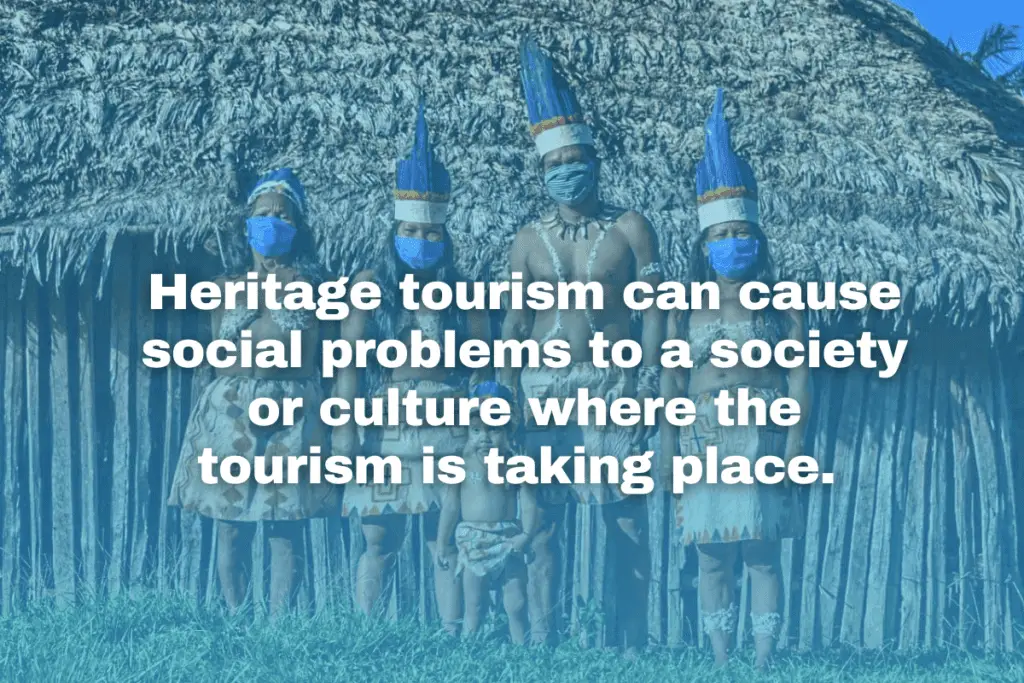
Heritage tourism can cause social problems to a society or culture where the tourism is taking place.
Heritage Tourism Can Hurt The Environment
Heritage tourism can hurt the environment, especially where the tours occur. This is because suddenly, many people can come to a location that is not used to having so many visitors.

Pollution, waste, and single-use plastics thrown on the ground or in the waterways can hurt the environment. The pollution may affect many small farmers trying to grow crops to survive and support their families.
When not handled correctly, one of the most significant drawbacks of heritage tourism is environmental issues. Environmental issues can become irreversible in some cases as pollution has gotten so far out of hand.
We believe that anyone looking to live their life as a global citizen should also be responsible for all types of tourism that they may do. Any time you visit another culture, location, or place, you should always try to live to leave it better than it was when you got there.
10 Reasons Why Heritage Tourism Remains a Timeless Attraction
The allure of stepping back in time, tracing the paths of ancestors, and unraveling the mysteries of bygone eras – heritage tourism offers all this and more. As people continue to flock to historic sites and cultural hubs year after year, we explore ten reasons that underscore the undying popularity of heritage tourism:
- Understanding Culture: Heritage tourism provides a firsthand experience of diverse cultures. By immersing in local traditions, festivals, and rituals, travelers gain a deep appreciation of the cultural fabric of a place.
- Understanding History: More than just dates and events, history shapes societies and narratives. Heritage tourism allows travelers to delve into the stories, heroes, and turning points that have shaped nations and civilizations.
- Visiting Important Historical Sites: There’s a unique thrill in walking the corridors of ancient castles, exploring prehistoric caves, or standing at the epicenter of historic events. Such sites serve as tangible links to the past.
- Authentic Experiences: In an age of commercialized travel, heritage tourism offers authentic experiences. From tasting century-old culinary recipes to participating in traditional crafts, it promises genuine, unfiltered encounters.
- Genealogical Quests: Many embark on heritage tourism to trace their roots, visiting ancestral homes or towns. Deep personal journeys allow individuals to connect with their lineage and familial history.
- Economic Benefits: Heritage sites often act as significant revenue sources for local communities. Tourists’ expenditures support local businesses, artisans, and guides, ensuring the economic sustenance of these regions.
- Educational Value: For families and educators, heritage tourism offers experiential learning. Historical narratives, art, and architecture come alive, transforming destinations into open-air classrooms.
- Architectural Wonders: Heritage sites often showcase architectural marvels, from the intricate carvings of temples and the grandeur of palaces to the engineering feats of ancient civilizations.
- Promotes Conservation: The popularity of heritage tourism underscores the value of conserving historical sites. Preservation efforts are often bolstered by tourism revenues and heightened awareness among visitors.
- Sense of Belonging: Exploring the shared history and collective memories of humanity gives travelers a sense of belonging. It reminds them of the interconnectedness of human stories and the universality of our past triumphs and tribulations.
Heritage tourism is a bridge between eras, a dialogue between the old and the new. It reminds us of our collective journey, celebrates our achievements, and offers lessons from our past. As the world races towards the future, the echoes of yesteryears found in heritage sites serve as both an anchor and a compass, making this form of tourism perpetually enchanting.
If you’re seeking efficient ways to navigate the United States, we suggest referring to the Book a Way website. This platform offers valuable insights and clear guidance on traveling between various locations within the country. To learn more about their services, click on the link provided below.
At A Bus On A Dusty Road, we talk about everything about travel, life, and ex-pat living. We are all about “Living Life As A Global Citizen.” We explore social, cultural, and economic issues and travel.
We would love to have you be part of our community. Sign up for our newsletter to keep up-to-date by clicking here. If you have any questions, you can contact me, Anita, by clicking here.
Listen to our Podcast called Dusty Roads. You can find it on all major podcast platforms. Try out listening to one of our podcasts by clicking here.
Subscribe to our A Bus On A Dusty Road YouTube Channel filled with great videos and information by clicking here.
Frequently Asked Questions
What are the advantages of heritage tourism
Heritage tourism allows visitors to experience and appreciate the cultural, historical, and natural significance of a place. It can contribute to the local economy, promote cultural exchange, and create a sense of pride and identity for the local community.
What are the advantages and disadvantages of historical sites?
Historical sites offer opportunities for education, preservation of heritage, and tourism revenue. However, some disadvantages can include wear and tear on the sites from visitors, challenges in maintaining historical accuracy, and the need for extensive restoration and maintenance efforts
What are the disadvantages of visiting historical places?
Some disadvantages of visiting historical places can include entrance fees or costs, overcrowding during peak seasons, limitations on visitor activities or access, and the potential for negative environmental impacts if not managed sustainably.
How can heritage tourism benefit local communities?
Heritage tourism can provide economic opportunities for local communities through job creation, the development of tourism-related businesses, and increased spending by visitors. It can also help preserve local traditions, crafts, and cultural practices.
Are there any negative impacts of heritage tourism on local communities?
Some negative impacts of heritage tourism on local communities may include increased living costs, loss of authenticity or cultural integrity due to commercialization, displacement of local residents, and cultural commodification.
What are the environmental advantages of heritage tourism?
Heritage tourism can promote environmental conservation by raising awareness of the importance of preserving natural surroundings, encouraging sustainable practices among visitors, and providing funding for conservation efforts.
How do historical sites contribute to education?
Historical sites provide tangible and immersive learning experiences that help individuals understand and connect with the past. They offer insights into different cultures, events, and historical contexts that textbooks and classrooms cannot replicate.
Are there any economic disadvantages associated with heritage tourism?
Economic disadvantages of heritage tourism can include income disparities between tourism-related businesses and other local industries, dependence on tourism revenue, and potential negative impacts on traditional economic activities.
Can heritage tourism help preserve endangered heritage sites?
Yes, heritage tourism can play a role in preserving endangered sites by raising awareness, generating funds for restoration and conservation efforts, and providing a reason for local authorities to prioritize site protection
How do historical sites impact local identity and pride?
Historical sites often hold significant cultural and historical value for local communities, contributing to a sense of identity, pride, and connection to the past. They can enhance community cohesion and promote cultural heritage.
Are there any social disadvantages associated with heritage tourism?
Social disadvantages of heritage tourism can include overcrowding and strain on local infrastructure, potential conflicts between tourists and local residents, changes in community dynamics and traditional ways of life, and the potential for cultural appropriation or misrepresentation. It is important to address these challenges to ensure that the social fabric of the local community is preserved and respected.
Related Questions
What is Heritage Travel? Helping You Get The Most Out of Heritage Travel
Heritage travel is about immersing yourself in another culture, time, or place. It is about reconnecting to your past, present, and future. The correct way to travel with heritage travel is to make sure you take the time to research and plan your journey.
By clicking here, you can discover What is Heritage Travel? Helping You Get The Most Out of Heritage Travel.
Is Vietnam Safe For Tourists? Tips To Stay Safe In Vietnam
Vietnam is a safe place for tourists to travel. But like any country in the world, there are precautions that you need to take to ensure your safety. Most Vietnam crimes are considered crimes of opportunity; someone may see your backpack is not secure, so they will grab it. To stay safe in Vietnam, remain vigilant and use your common sense.
To learn more, you can read our blog on Is Vietnam Safe For Tourists? Tips To Stay Safe In Vietnam by clicking here.

